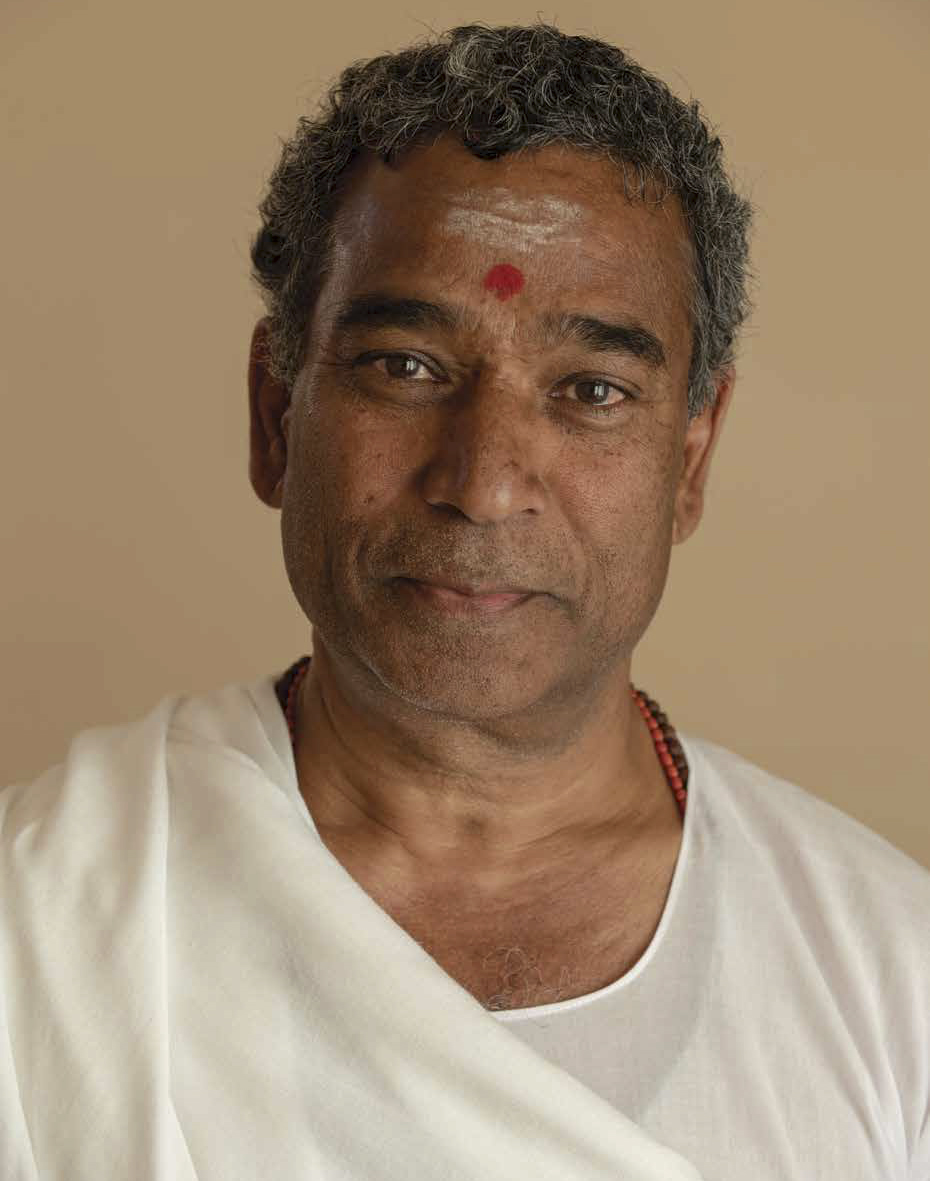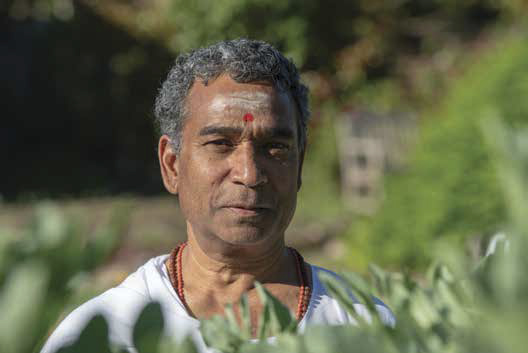At Sonoma Ashram, Babaji’s formula for being well means being whole in body, mind and spirit.
You probably can’t see it, but there is a transparent cone of silence, nestled invisibly over a four-acre parcel just off Arnold Drive on the west side of the Sonoma Valley, where tension and stress, fear of the future and worries about the past, even the inevitable intrusion of thoughts about presidential politics, simply evaporate.
That space is occupied and blessed by the Sonoma Ashram, where experiencing wellness and wholeness is the only objective. Its founder, Baba Harihar Ramji—aka Babaji—is sitting barefoot in a white robe with a red tilak dot and a faint swath of sandalwood paste on his forehead. He is preparing to answer the absurdly sweeping question, “What is wellness and how do we achieve it?”
His answer, delivered with a direct gaze and the slight trace of a smile, is blessedly simple and deeply profound.
“The connection of body, mind, and spirit, the unification of all three, really gives us wellness,” he says. “First of all, the wellness of the body. If your body is not feeling comfortable, the most beautiful thing could be right in front of you and you will not be able to appreciate it. In order to work toward our wellness, first we have to pay attention to our body, to do whatever is necessary to keep it healthy.”
After caring for the body, Babaji continues, “comes the mind. We can have a very healthy body, but if mind is not at peace and not balanced, then it can cause all kinds of trouble for us. With a healthy body and balanced mind, we get a glimpse of the spirit.
“And when that spirit is directed toward the wellness of all, the happiness of all, then everything comes together. You can have a healthy body, you can have a healthy mind, but if you are only focused on yourself, then something is missing, and we keep on running, looking for what is missing.”
The happiness most of us seek, he says, “you are seeking in things and objects and situations outside; that happiness is really within you. Work begins when we shift our attention to our self. The body is more tangible, we start there. Then it goes to the mind, then it goes to the spirit. Very simple. Of course, the simple thing can be the hardest thing.” Babaji knows whereof he speaks, not just because of the deep spiritual tradition that defines his mission, but because he too discovered something was missing in his own life and eventually went to find it.
He came to the U.S. from India to get an education, then ran a California business for 10 years, accumulated lots of things, and, in time, asked himself, “What’s next?” During a visit back to India he met the man who would help guide him toward the answer, an enlightened master named Aghoreshwar Bhagwan Ram.
“I said, ‘I have everything I can imagine. I have my ranch, I have my Mercedes, I got my toys. Now what?’”
It took a few years for the answer to gel, during which the man who would become Babaji spent as much time as he could in the company of his new teacher.
“Finally one day, we had a conversation and he said, ‘OK, if you are ready, you have to walk away from everything you have created. Go to a new place penniless, a place where you don’t know anyone.’”
So Babaji did exactly that.
“I gave away all my belongings to whoever wanted them, filled my car with gas, had a big breakfast, a sleeping bag and a couple changes of clothes in my car, and I left town. I didn’t know where to go, but I was driving on 101, came to Santa Rosa and I saw the sign ‘Sonoma.’ To me, it read ‘sono-ma.’ ‘Sono’ means listen; ‘ma’ is all divine mother. This thought came in my mind—‘listen’—and I just took the exit.”
Babaji’s teacher had told him, if he accepted the challenge, “The first three days you’ll be tested and tried. The fourth day, you will find a place to set your foot. You should know the divine blessing is with you.”
In Sonoma, knowing no one, he discovered the Plaza, found a bench and sat there all day. He slept in his car that night, and spent the next day back on the bench. “No money, no food, I just sat and watched people walk around. I just didn’t know what to do, where to go, who to ask, where to begin.”

On the third afternoon, increasingly hungry, Babaji was back on the bench when a woman sat down, a conversation started and the name Patty Westerbeke came up. A Sonoma institution, she had spearheaded the creation of Westerbeke Ranch Conference Center and had just returned from India. Introductions followed, Babaji visited the ranch, one thing led to another, and he soon found ‘a place to set his foot.’ In time, a following congealed around the man and his message and, 30 years ago, the ashram was established. It is now resplendent with lush gardens of flowers and organic vegetables, quiet pathways, a bamboo grove, residence space, a dining hall, chapel, and meditation spaces scattered about the property.
There is also a professional kitchen and a five-star, organic chef in residence—Adam Lovelace, formerly of Greens restaurant in San Francisco. Classes are offered in healthy cooking, how to grow, process and cook. There are classes on yoga, meditation, and Ayurveda, and group meditations are held each morning and evening. “Whoever in the community wants to meditate,” says Babaji, “then come and sit in the group to find the help and support … We offer this environment for people in the community to come and learn and take this richness home.”
That richness flows from the pursuit of wholeness, says Babaji. “When we are connected with our wholeness, when you are full, that fullness overflows, and that overflow is called ‘seva,’ selfless service in the world. No matter what I do, it becomes seva if I am coming from that place of wholeness.”
The essential purpose of the ashram, Babaji says, “is about the unification of body, mind, and spirit. It’s about self-care. When an individual is healthy and happy, society becomes healthy and happy. Anything I can do to support that, that gives meaning to my life and being here.”
Exercising this advice in daily life takes a certain level of mindfulness. If nothing more, says Babaji, start by taking three simple steps repeated throughout the day. “As we pursue self-care,” he says, “it’s very important for us to think of these three things: Stop, take a step back, take a deep breath. May it become like you place a comma in a sentence of the day. Unless we practice coming back to our natural self, a very invisible kind of tension keeps building in our body and our psyche, and that tension keeps snowballing, getting bigger and bigger.”
Most people find that snowball melts quickly inside the psychic shelter of the ashram. “Most of all,” says Babaji, “we hold the ashram grounds as a sanctuary of peace which is open for anyone to come, at any hours, and find a quiet place to be oneself, or if somebody seeks somebody to talk to, somebody is always available. And whether I have a spiritual practice or not doesn’t really matter. What matters is, how do I come back to my natural state of being.”

